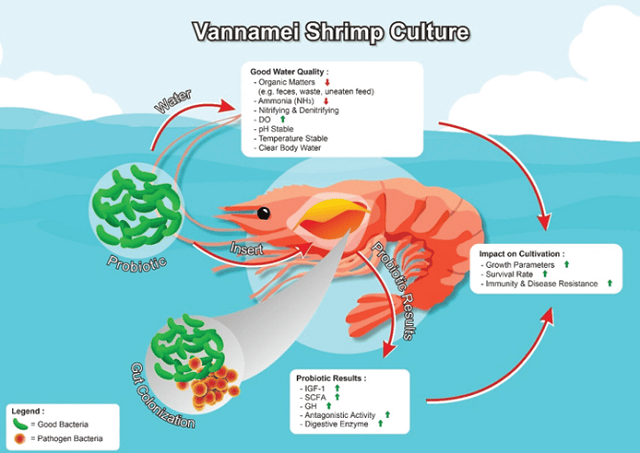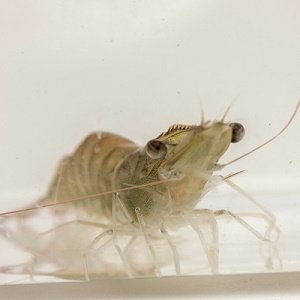
Research on the use of probiotics has mainly focused on increasing the production of vannamei shrimp aquaculture. These beneficial bacteria are widely used and are often provided through food or injections.
Researchers from Universitas Lampung and King Abdulaziz University published a scientific review on the contribution of probiotics to the improvement of vannamei shrimp production.
Probiotic mechanisms for improving performance
Previous studies have shown that bacteria such as Bacillus, Lactobacillus, Enterococcus, Alteromonas, and Arthrobacter spp. can improve performance parameters (growth, survival, immunity, disease resistance, and water quality) in shrimp farming through multiple mechanisms.
Researchers cite that these mechanisms include gut colonization, antagonistic activities, secretion of digestive enzymes, removal of organic waste, and the production of supplementary nutrients (biotin, vitamin B12, essential amino acids, fatty acids, etc.).
Before activating these mechanisms, bacteria enter the gut, restore the composition of the gut microbiome, and introduce functions that are beneficial to the gut microbial community.
Field applications of probiotics
Probiotics can be classified into several types depending on their application in the field: in a medium or immersion, oral, and injection.
According to the study, probiotics that are added to water (medium) can grow in the medium by absorbing all the nutrients present in the water. This allows all digestible food present in the water to be absorbed, resulting in starvation of any bacteria present due to malnutrition.
Probiotics are also provided to shrimp orally through food to increase beneficial microflora in the gut; and can also be administered through Artemia or microalgae rich in probiotics to improve growth and survival.
Stimulation of growth and better survival rate
Growth performance is an important parameter in vannamei shrimp farming due to the cost and time required for shrimp to grow from postlarvae to commercial weight.
Stay Always Informed
Join our communities to instantly receive the most important news, reports, and analysis from the aquaculture industry.
According to the study, some of the reported bacteria that help in shrimp growth are Bacillus, Clostridium, Lactobacillus, Psychrobacter, and Arthrobacter spp. These bacteria can be found in the intestines of vannamei shrimp and provide many benefits.
Immune modulation and disease resistance
To increase shrimp resistance to diseases, probiotic treatments stimulate non-specific disease resistance in the body.
Several diseases that affect farmed shrimp are caused by Vibrio alginolyticus, Vibrio parahaemolyticus, Aeromonas, Photobacterium, Tenacibaculum, and Shewanella spp.
Lactobacillus and Bacillus spp. are groups of bacteria that are widely used as stimulants in vannamei shrimp, such as Lactobacillus plantarum, Lactobacillus rhamnosus, Lactobacillus fermentum, Lactobacillus paracasei, Lactobacillus pentosus, Bacillus subtilis, Bacillus licheniformis, Bacillus pumilus, and Bacillus coagulans.
Other groups of bacteria used as stimulants for immune response or body resistance in vannamei shrimp include Pseudomonas, Nitrosomanas, Aerobacter, and Nitrobacter spp., as well as Rhodobacter sphaeroides, Clostridium butyricum, and Enterococcis faecium.
Effects on water quality
The addition of probiotics in the vannamei shrimp aquaculture can improve water quality. Probiotics such as nitrifying bacteria or Lactobacillus and Bacillus spp. have been shown to affect dissolved oxygen, pH, ammonia, and alkalinity in water, as these bacteria oxidize ammonia to nitrites and convert nitrites to nitrates.
Surprisingly, the use of probiotics in water reduces the content of dissolved oxygen in water, even below safe limits for the needs of vannamei shrimp.
Probiotics are also used in biofloc systems for the production of vannamei shrimp and are reported to maintain good water quality in these systems. Probiotics promote water quality through nitrification and denitrification and induce the formation of biofloc.
Conclusions
As dietary supplements, probiotics increase the competitive exclusion of pathogens from aquaculture systems and improve shrimp immune parameters without affecting their health.
Probiotics can be considered a better alternative to antibiotics and similar products to protect and maintain environmental stability.
Despite the benefits, there are concerns when probiotics are applied in inappropriate amounts, which can lead to excessive nutrient production and affect the microbial community.
Finally, the study reports that probiotics have the highest effectiveness in increasing shrimp production compared to antibiotics. “However, these findings require additional research on the molecular pathways that regulate the probiotic mechanism that affects shrimp metabolism,” concluded the researchers.
Contact
Muhammad Browijoyo Santanumurti
E-mail: m.browijoyo.s@fpk.unair.ac.id
Reference (open access)
Amiin MK, Lahay AF, Putriani RB, Reza M, Putri SME, Sumon MAA, Jamal MT, and Santanumurti MB (2023) The role of probiotics in vannamei shrimp aquaculture performance – A review, Veterinary World, 16(3): 638–649.
Editor at the digital magazine AquaHoy. He holds a degree in Aquaculture Biology from the National University of Santa (UNS) and a Master’s degree in Science and Innovation Management from the Polytechnic University of Valencia, with postgraduate diplomas in Business Innovation and Innovation Management. He possesses extensive experience in the aquaculture and fisheries sector, having led the Fisheries Innovation Unit of the National Program for Innovation in Fisheries and Aquaculture (PNIPA). He has served as a senior consultant in technology watch, an innovation project formulator and advisor, and a lecturer at UNS. He is a member of the Peruvian College of Biologists and was recognized by the World Aquaculture Society (WAS) in 2016 for his contribution to aquaculture.







